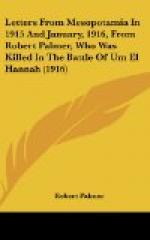Let me begin at November 24th, the day we heard of the victory at Ctesiphon or Sulman Pak. That afternoon I crocked my leg at footer and have been a hobbler ever since with first an elephantine calf and now a watery knee, which however, like the Tigris, gets less watery daily.
The very next day (November 25th) half the battalion, including my “A” Coy., was ordered up stream and departed next morning, leaving me fuming at the fancied missing of a promenade into Baghdad. But providence, as you may point out in your next sermon, is often kinder than it seems. Two days later I could just walk and tried to embark: but the M.T.O. stopped me at the last moment. (I have stood him a benedictine for this since.)
Meanwhile, events were happening up-river. The Press Bureau’s account, I expect, compresses a great deal into “Subsequently our force took up a position lower down the river” or some such facon de parler. What happened was this. We attacked without reserves relying on the enemy having none. We have done it several times successfully: indeed our numbers imposed the necessity generally. This time there were reinforcements en route, had we waited. But I anticipate.
Well, we attacked, and carried their first line and half their second before darkness pulled us up. A successful day, though expensive in casualties. We bivouacked in their first line. Daybreak revealed the unpleasant surprise of strong enemy reinforcements, who are said to have diddled our spies by avoiding Baghdad: 5,000 of them. As we had started the affair about 12,000 strong to their 15,000, this was serious. They attacked and were driven off. In the afternoon they attacked again, in close formation: our artillery mowed them, but they came on and on, kept it up all night, with ever fresh reinforcements, bringing them to 30,000 strong all told. By dawn our men were exhausted and the position untenable. A retreat was ordered, that meant ninety miles back to Kut over a baked billiard table. The enemy pressed all the way. Once they surrounded our rear brigade. Two officers broke through their front lines to recall the front lot. Another evening we pitched a camp and left it empty to delay the enemy. Daily rearguard actions were fought. Five feverish days got us back to Kut, without disorder or great loss of men; but the loss in material was enormous. All possible supplies had been brought close up to the firing line to facilitate our pursuit: mainly in barges, the rest in carts. The wounded filled all the carts, so those supplies had to be abandoned. The Tigris is a cork-screwed maze of mud-banks, no river for the hasty withdrawal of congested barges under fire. You can imagine the scene. Accounts differ as to what we lost. Certainly, two gunboats (destroyed), one monitor (disabled and captured), the telegraph barge and supply barge, besides all supplies, dumped on the bank. Most accounts add one barge of sick and wounded (400), the aeroplane barge, and a varying number of supply barges. In men from first to last we lost nearly 5,000: the Turks about 9,000—a guess of course.




